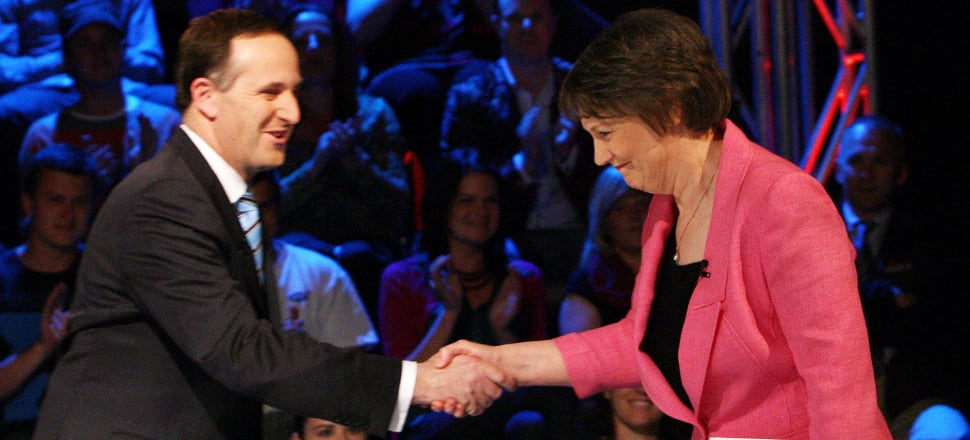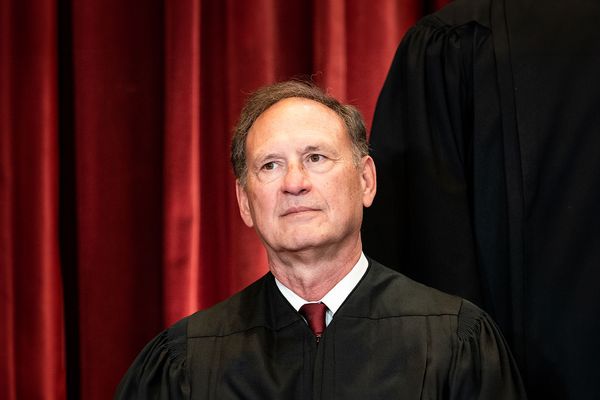
The latest debate among leading Auckland mayoral candidates had a few sharp and personal turns, with tense moments for some and unsubtle policy adjustments for others
Awkwardly for the Labour-backed candidate Efeso Collins, his main rival Wayne Brown keeps claiming regular text-message support from former Labour Prime Minister Helen Clark.
At the latest Auckland mayoral debate, Brown again detailed contact he claimed Clark and another former PM, John Key, were making with him through the campaign. This time he claimed the pair had helped him by contributing to a special case of wine, featuring their signatures.
"They sold quite well," Brown went on, noting few others in politics would be able to attract such bipartisan support.
"In the last week I've had texts from both John Key and Helen Clark advising me - with often conflicting advice," he quipped.
It's not the first time Brown has invoked the favour of the two heavyweights of New Zealand politics and it can't be easy for Collins, nominally an independent but backed by Labour, to hear.
How much of that interest from former Prime Ministers is real, or perhaps exaggerated for effect from an occasional enquiry or interaction, can only be known on the phones of the texters. How many of the exchanges were initiated by Brown is also unclear.
But Clark will have no doubt offered support to the Collins campaign as well and neither ex-politician is likely to be thrilled at their names, and supposed imprimatur, being used openly at public meetings.
Collins has already claimed the intended vote of Goff, and the backing of former deputy mayor Penny Hulse, and this week former Waitakere mayor Sir Bob Harvey. Interestingly, Brown claims that Harvey, too, had a say early on in his decision to stand and he was at his campaign launch. But Harvey would only go so far to the NZ Herald last month to say that he "sees his value".
In any case, the Collins camp is outwardly sanguine about Brown's claims, perhaps secure in its own experiences with Clark and Harvey. But the candidate must wince each time Brown plays the Labour leader card.
It wasn't the only awkward moment in a debate of sometimes testy exchanges.
Craig Lord, who is running in third place in the latest Auckland Ratepayers' Alliance-Curia poll on 8 percent support, had to justify his repeated claims to being an 'engineer'.
He makes much of his engineering background, coupled with his latter years in media, to claim he understands how things work and is uniquely placed to communicate that to the ratepayers.
One of the Ratepayers' Alliance meeting's presenters, Stuff columnist and liquidator Damien Grant, took it upon himself to liquidate that claim to engineering expertise, asking precisely what professional experience Lord had.
"I'm a maintenance, pneumatic, hydraulic, factory automation, diagnostic, fitter and turner, an engineer and a welder as well," Lord said, adding that you don't need a degree to be called an engineer.
Brown, a qualified and university graduated engineer, begged to differ. "Actually, you do get a degree in engineering."
Lord: "Not in my engineering."
Grant said it was Lord who kept emphasising he was an engineer. "That's a fairly big call."
Things became even more prickly when Grant then asked about a former Lord company having run into financial troubles. Lord said a business he had which involved steel-framed houses had been left high and dry when another company removed machinery and took it to Texas. "I had to go into receivership - in 2003."
Quizzed further about his own media business and management experience, Lord said the role of mayor was a leadership role, not a management position and turned to the audience and asked: "Does everyone here want a leader?" Many assented. Lord then turned his phone to the crowd, citing support messages from ordinary citizens, not from Helen Clark or John Key.
Lord's involvement in the major candidate debates has jumped in the past month after the withdrawal of first Leo Molloy and then Viv Beck. He has failed, poll wise, to move the dial however, stuck around the 8 percent mark that he achieved in the actual election result in 2019.
Brown has benefited from his two non-left rivals exiting - and he passed Collins for the first time in the Ratepayers' Alliance-Curia monthly polls, to lead 28 to 26. Beck scored 10 percent, meaning there are still some voter segments up for grabs.
Collins seemed to both respond fast to the changed electoral equation - and be a little less equanimous on stage than usual.
Towards the end of the debate, as he answered a question on co-governance and the Tūpuna Maunga Authority's policies on exotic trees, murmurings and interjections from the audience saw him confront their reaction.
"If you could not be so rude and let me finish," he said, noting he'd not interrupted others' viewpoints earlier. And then, as the objections to what he was saying ebbed: "Thank you very much. We will all act like adults."
He explained that the authority was compelled to consult on any plans and that would happen. Then, looking at the questioner, he said: "In life, you don't always get what you want - similar to [the fact] that people will vote for me."
It was a rare impatient moment from Collins, who usually cuts a calm figure.
But perhaps it was because he had just heard Wayne Brown, again awkwardly, saying the Tūpuna Maunga Authority's co-governance model might need the addition of "forceful characters representing the public, to balance the forceful characters representing alternative interests".
Brown believed "we've allowed it to wander away. They are required to take care of all residents. It's been hijacked by a certain sector."
Collins' adjustments on his previously argued views on other issues included a concern about the "middle management" at the council - long an area targeted by Brown as costly and inefficient. Collins said councillors would need to ensure they gave a clear written directive to the chief executive to consider if the balance of staff, including middle management, was correct.
He conceded, under questioning, that current mayor Phil Goff had made a mistake in removing councillors from the board of Auckland Transport. "It's a mistake to not have them on the board. They will come back."
And Collins, in a rare direct criticism of council business, revealed it was paying $4 million a month to law firm Russell McVeagh. "We've already got in-house lawyers," he said, almost adopting the tone of Brown and Lord when they claim excess and over-spend at the council. He'd been was asked where he might go for savings to fund his fares-free public transport policy.
The awkward moments continued with Brown facing a question from the floor - by agreement with the Ratepayers' Alliance organisers - from New Zealand Herald journalist Simon Wilson whom he had refused to appear with for an online debate last week.
To Wilson's questions probing Brown's repeated promise to finish current projects before starting others, Brown seemed to finesse his position to mean he wanted only the biggest infrastructure projects such as the City Rail Link and the Manukau sewerage interceptor finished before other major plans were considered. Despite being told he'd regularly promised to get rid of all the red road cones, Brown said he had never meant that all works projects would be put on hold.
He denied Wilson's argument that halting projects would sever the infrastructure pipeline long advocated by the major players in that sector wanting certainty and a known sequence of works.
Lord interjected that Brown's narrative the whole campaign had been about "all Auckland's projects" and that they were overdue and over cost. He accused Brown of political point-scoring rather than finding out directly what the status was of infrastructure plans. In the case of the sewer project, all it had taken Lord was one phone call to learn that things were proceeding on budget and delayed by just six months, due to Covid.
Awkward.







